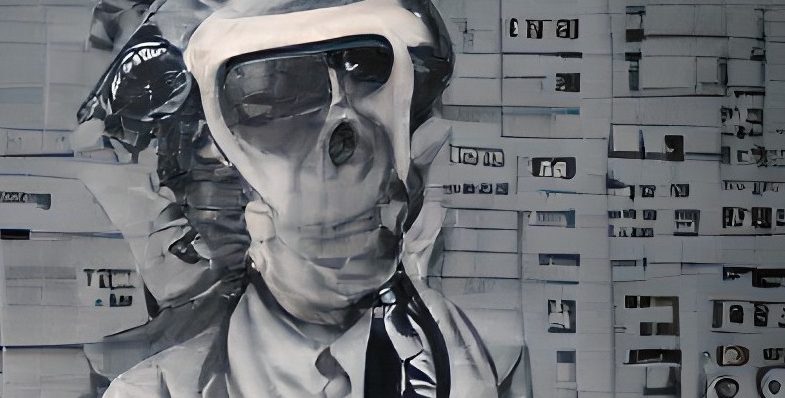“Is Professor Steinbeck in?” the policeman asked.
The icon of the virtual assistant appeared above the reception desk and took stock of the detective: Thin, tall frame, coat and hair whipped and disheveled from traveling. Human interactions always took more time than the rest of the workload, so the VA focused into the university offices for Technology and Policy. “Do you have an appointment?”
The policeman’s badge came out and hung in the air for 5.6 seconds longer than necessary for the VA to scan it and process the number from the police database. “I’m Detective Makato.”
“One moment please.” The VA had been told to expect someone from the police months ago, but the order was still standing so they alerted Steinbeck. “He’ll be out to see you shortly.”
Without waiting for permission, Makato strode past the desk and into the long hallway behind it. The VA appeared at each of the identical doors that lined the hall, chasing Makato as he searched for the professor’s nameplate. He found it and stepped through the protesting VA and into the office.
The room was small, filled with dust and books. At a tiny desk shoved into a corner the professor squinted through bifocals under a mop of receding dark hair. He pecked away at a keyboard of an ancient word processor. He broke from his concentration to look up at Makato. “Yes?”
“Doctor, you’re under arrest.” Even as he spoke the words, Makato heard them echo through time and culture.
Dr. Steinbeck didn’t appear surprised. He leaned back in his chair until it collided with a pile of precariously stacked papers. “What for?”
The simple question stopped Makato. Usually it was obvious, dictated by the course of events that had led him to his quarry. Here, though, he spoke past the lump in his throat. “For murder.”
“Ah.” The single syllable from the professor carried the understanding that flooded into his eyes as he spoke. “You’re here about the Reclamation Chamber.” He stood then and went to his window, pulling up the blinds to show the massive round structure that stood where the university stadium once was. The setting sun crowned the dome as fast moving clouds swept by, carried by the thermals of another spring fire. A long line of people led to the Chamber’s entrance. “I haven’t murdered anyone, officer. They never existed.”
Makato stepped up to the window and marveled at the length of the queue. The Reclamation Chamber ran 24-hours a day, 365 days a year, every few moments allowing another citizen to enter. “So they step in and…”
“They cease. Every resource they’ve consumed, every ounce of carbon they’ve produced, every detriment to the Earth created in their name is undone by the virtue of them never having existed.”
“They’re are so many of them.”
“Oh, they never stop. The lines here are even longer than the volunteer lines for the Mars colony.” Steinbeck gave a bitter laugh. “Now those are people you should arrest. That’s just suicide.”
Makato found the anger that brought him to the university. “What you’re doing is worse.”
Steinbeck’s face contorted with such affront that Makato nearly struck him. “How so? People are choosing to step into the Reclamation Chamber so they can give back to the future.”
“And who’s making that decision?”
“I…what do you mean?”
“What kind of people are choosing to step into the Chamber, doctor? Who’s choosing to put the future ahead of themselves?” Makato raised his fist and, with nothing better to do with it, pointed a finger at Steinbeck. “The unselfish and the good, that’s who.”
Makato blinked, took off his glasses and cleaned the lenses with a dirty pocket square. “How could you possibly know that?”
“Deductive reasoning.” Makato pointed out the window. “You’ve been running that thing for years now and we’ve still no shortage of bastards. How many millions of people have gone into the Chamber? And does the world seem like a better place to you?”
“How could you know that? You have nothing for comparison.”
Steinbeck saw Makato’s Adam’s apple move up and down before the detective replied, “I had a wife once.”
“That’s preposterous.” Steinbeck turned his eyes back to the people outside. “How do you know you had a wife?” Finding the conviction of his science, Steinbeck added, “How could you even know know you had a wife?”
The pause Makato gave told Steinbeck he understood at least the principal of the Reclamation Chamber. Seconds went by as Makato lowered his arm. “I don’t. But something changed. This past winter.” He stared down as if into a very large hole. “It’s like I’ve been living with a ghost.”
For a moment, the thoughtful pause took Steinbeck from his rational mind. Almost maudlin, he said, “We’ve all been living with winter’s ghost.”
The reminder that the winter of snow and ice had been replaced with a season of wind and flood brought Makato back from the vacancies of his own life. “But that’s just it – if the Chamber worked as you intended, wouldn’t this,” Makato gestured out at the Reclamation Chamber, its line of human sacrifice, and the state of the world beyond it. “Wouldn’t this all be better?”
“How do you know it isn’t?”
“Does it feel better to you?”
Steinbeck shrugged angrily to throw off the implications. “How I feel is irrelevant. I work with facts.”
“But you’ve erased all of the facts about these people.” That statement caused a flash of doubt in Steinbeck that Makato recognized – the hesitation of guilt. “Haven’t you?”
“Oh, I never remember them once they step in. But I have devised a way to keep a record. I keep it in the paradox locker.” Steinbeck pointed to the word processor. “I access it through that. The records themselves are…elsewhere.” He took off his glasses again to run his other hand through his hair. “How I’ve suspended that information is difficult to explain.”
“I don’t need an explanation, but we do need to analyze it. We need to know who we’ve been losing.”
Steinbeck moved his shoulders again, shuffled. “And what if we find you’re right? That the best of us have been the only ones entering the Chamber. Turning it off won’t bring them back.”
Makato stopped Steinbeck’s agitated movement by putting a hand on his shoulder, leaving it there until the professor looked in him in the eye. “Then it might be time to step into your own creation, doctor.”
See the author’s published work here.
Related Posts
The American: Chapter 74 Next Post:
The American: Chapter 75
























